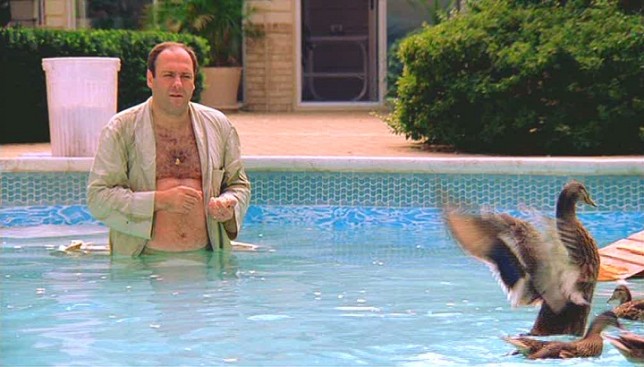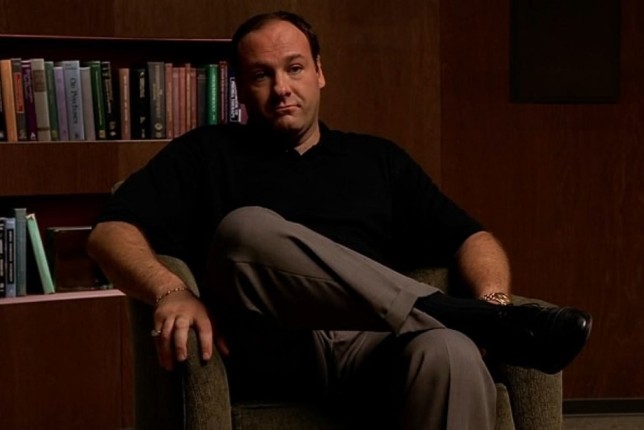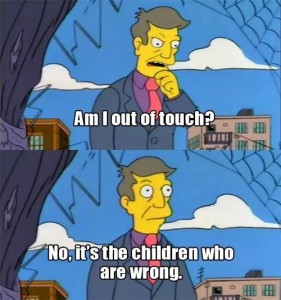The Sopranos S1E1: “Pilot” Recap and Analysis
“Mid-Life Crisis in a Nutshell” might be a good name for the first episode of The Sopranos. Of course, being the mob boss of a dying breed of criminals, with a family of fiery, old-fashioned Italian relatives, probably makes for slightly more chaotic and emotionally complex life crisis than your average middle-aged adult might face.
It’s a testament to the sheer strength of will and character possessed by protagonist Tony Soprano, that he handles the swirling vortices of stress and trauma as well as he does. That’s not to say he’s the epitome of tranquility and grace, but in comparison to his boisterous family members and colleagues, Tony manages a remarkable degree of composure. But the cracks are beginning to appear, and after a family of ducks that had been nesting in his pool take flight and vanish into the sky, Tony finally decides to seek help in the form of a therapist.

Tony’s visit to the therapist sets the backdrop for the episode, and it’s a clever framing device for the unfortunate truckload of exposition necessary in pilot episodes. We’re quickly introduced to the modern era’s version of organized crime: where once labor unions and bootleg liquor were the bread and butter of the mafia, now we have Waste Management companies and garbage, Health Corporations and insurance fraud. Evading the law is also a lot more difficult. New technologies, new legislations, “the RICO Statutes,” as Tony tells his therapist irritably. Later in the episode we hear Tony bemoan the bygone integrity of his ancestors, how now “everyone’s turning states witness. No one’s got room in their life for the penal system”.

The changing nature of the times and the decay of the old families is a theme we see repeated throughout the episode. The Sopranos and those they associate with are a fondue of hypocrisy and malice, the antithesis of the tradition nuclear family of the 1950’s. “You’ve become a master of lying and deceit!” Carmela screams at her daughter, Meadow; later we find out that Carmela herself is engaged in an affair with a priest, or “becoming a better catholic”, as she calls it. Tony claims to have stopped seeing his former mistress; shortly before a fancy dinner with his wife we see him frolicking with a busty blonde woman on a private yacht. His mother, Livia, in the midst of a rapid deterioration in her health and sanity, refuses to relocate to a retirement community, as tony calls it, or a nursing home, as Livia see it, and continually mourns the loss of her late husband. “He was a saint,” she cries, dapping a tissue to her teary eyes. Tony, though embroiled in deceptions of his own, is acutely aware of the problems plaguing his family and his business. He views the ducks as representations of his own family, and their departure as an ill omen for the future of the Sopranos.
Ultimately, our introduction to the world of the Sopranos is as much of a greeting as it is a farewell. The days when New York mobs threw World Series baseball games and held entire cities to ransom are long gone. What’s left are the tattered remains of once proud empires, old fools too stubborn to let go even in the face of imminent obsolescence, and arrogant youths trying to regain their ancestors’ former glory. The show paints a portrait of these two generations of men, the one seeking to regain their lost virility, and the other, younger generation, which seeks to supplant their aging relatives, and steal that virility for themselves. Tony Soprano, his uncles, and most of his associates, belong to the former, men who’s fathers grew up in a relative “golden age” of organized crime, who tutored their sons in the lessons of masculinity, hard work, being “tough”. Tony’s son Christopher, and the man he ultimately whacks, Emil, belong to the latter, dreaming of emulating their famous gangster forebears and winning back the glory of old. Photographers of famous gangsters from the 1940’s flash across the screen as Christopher pumps round after round into the back of a rival criminal, early jazz thumping in the background. “Loui Brazzi sleeps with the fishes,” Christopher snarls as they dispose of the body, quoting and ironically butchering the famous line from The Godfather. “Luca Brasi!” corrects his older companion impatiently in a scene that perfectly encapsulates the dichotomy between the two generations. “Luca Brasi.”
The episode ends with a long panning shot of the Sopranos’ birthday party in their backyard. As the camera rotates, the various family members gradually and steadily disappear off-screen. Finally, the camera ends on the now quiet and empty pool where the ducks once nested.
It’s not just the ducks that have moved on; the rest of the world has too.







